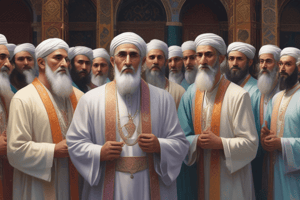Podcast
Questions and Answers
Copernicus delayed publishing his findings until 1543 because he was afraid of being imprisoned.
Copernicus delayed publishing his findings until 1543 because he was afraid of being imprisoned.
False (B)
Johannes Kepler was the assistant of Danish astronomer Tycho Brahe.
Johannes Kepler was the assistant of Danish astronomer Tycho Brahe.
True (A)
Galileo Galilei's discoveries supported Ptolemy's geocentric theory.
Galileo Galilei's discoveries supported Ptolemy's geocentric theory.
False (B)
The Catholic Church fully supported Galileo Galilei's ideas and findings.
The Catholic Church fully supported Galileo Galilei's ideas and findings.
The work of Francis Bacon and René Descartes greatly contributed to the development of the scientific method.
The work of Francis Bacon and René Descartes greatly contributed to the development of the scientific method.
Galileo stood trial before the Inquisition in 1616 for his support of Aristotelian theories.
Galileo stood trial before the Inquisition in 1616 for his support of Aristotelian theories.
The geocentric theory believed that the Earth was at the center of the universe and all celestial bodies moved around it in perfect circular paths.
The geocentric theory believed that the Earth was at the center of the universe and all celestial bodies moved around it in perfect circular paths.
Before 1500, scholars mainly determined truth by conducting their own observations of nature rather than referencing ancient Greek or Roman authors.
Before 1500, scholars mainly determined truth by conducting their own observations of nature rather than referencing ancient Greek or Roman authors.
The Scientific Revolution of the mid-1500s was characterized by a shift towards careful observation and questioning of accepted beliefs about the natural world.
The Scientific Revolution of the mid-1500s was characterized by a shift towards careful observation and questioning of accepted beliefs about the natural world.
Nicolaus Copernicus proposed the geocentric theory, which suggested that all celestial bodies revolved around the Earth.
Nicolaus Copernicus proposed the geocentric theory, which suggested that all celestial bodies revolved around the Earth.
The geocentric theory was widely accepted in the Medieval Ages due to its alignment with Christian teachings.
The geocentric theory was widely accepted in the Medieval Ages due to its alignment with Christian teachings.
During the Middle Ages, scholars rarely challenged established scientific ideas or church doctrine by conducting their own observations of nature.
During the Middle Ages, scholars rarely challenged established scientific ideas or church doctrine by conducting their own observations of nature.
Flashcards are hidden until you start studying



